Description This assignment takes an experimental approach t
Solution
Selection Sort:-Selection Sort Complexity is O(n^2).
void selectionSort(int* a, int size)
{
for (int i = 2; i < size; i++)
{
for (int j = i; j >= 1; j--)
{
if (a[j] < a[j - 1])
{
int temp = a[j - 1];
a[j - 1] = a[j];
a[j] = temp;
}
}
}
}
Merge sort:- Merge sorting complexity is O(nlogn).
void merge(int* a, int first, int middle, int last)
{
int j,i0,i1;
i0 = first;
i1 = middle;
// While there are elements in the left or right runs
for (j = first; j < last; j++) {
// If left run head exists and is <= existing right run head.
if (i0 < middle && (i1 >= last || a[i0] <= a[i1])){
b[j] = a[i0];
i0++;
}
else{
b[j] = a[i1];
i1++;
}
}
}
void split(int* a, int first, int last)
{
if (last - first<2)
return;
int middle = floor((first + last) / 2);
//cout<<first<<\" \"<<middle<<\" \"<<last<<endl;
split(a, first, middle);
split(a, middle, last);
merge(a, first, middle, last);
copyArray(a,b, first, last);
}
#include <iostream>
#include <stdlib.h>
#include <time.h>
#include <ctime>
#include <sys/time.h>
#include <fstream>
#include <math.h>
using namespace std;
int* b;
bool odd;
bool enablePrinting=false;
//Selection Sort
void selectionSort(int* a, int size)
{
for (int i = 2; i < size; i++)
{
for (int j = i; j >= 1; j--)
{
if (a[j] < a[j - 1])
{
int temp = a[j - 1];
a[j - 1] = a[j];
a[j] = temp;
}
}
}
}
/////////////////////////////
//Insertion Sort
void insertionSort(int* a, int size)
{
for (int i = 1;i < size;i++)
{
int x = a[i];
int j = i;
while (j > 0 && a[j-1] > a[j])
{
int temporaryVariable=a[j];
a[j] = a[j-1];
a[j-1]=temporaryVariable;
j --;
}
a[j] = x;
}
}
/////////////////////////////
//Merge Sort
void merge(int* a, int first, int middle, int last)
{
int j,i0,i1;
i0 = first;
i1 = middle;
// While there are elements in the left or right runs
for (j = first; j < last; j++) {
// If left run head exists and is <= existing right run head.
if (i0 < middle && (i1 >= last || a[i0] <= a[i1])){
b[j] = a[i0];
i0++;
}
else{
b[j] = a[i1];
i1++;
}
}
}
void copyArray(int* a,int* b, int first, int last)
{
for(int k = first; k < last; k++)
a[k] = b[k];
}
void split(int* a, int first, int last)
{
if (last - first<2)
return;
int middle = floor((first + last) / 2);
//cout<<first<<\" \"<<middle<<\" \"<<last<<endl;
split(a, first, middle);
split(a, middle, last);
merge(a, first, middle, last);
copyArray(a,b, first, last);
}
/////////////////////////////
int* populateArray(int size)
{
b=new int[size];
int* a = new int[size];
for (int i = 0;i < size;i++)
{
srand(rand()*i);
a[i] = rand() % 100;
b[i]=-1;
}
return a;
}
void printArray(int* a,int size)
{
for (int i = 0;i < size;i++)
{
if(enablePrinting)
cout<<a[i]<<\" \";
}
if(enablePrinting)
cout<<endl;
}
long long now()
{
struct timeval timeNow;
gettimeofday(&timeNow, NULL);
return (timeNow.tv_sec * 1000000 + timeNow.tv_usec);
}
int diff(timespec end, timespec start)
{
timespec temp;
if ((end.tv_nsec-start.tv_nsec)<0) {
temp.tv_sec = end.tv_sec-start.tv_sec-1;
temp.tv_nsec = 1000000000+end.tv_nsec-start.tv_nsec;
} else {
temp.tv_sec = end.tv_sec-start.tv_sec;
temp.tv_nsec = end.tv_nsec-start.tv_nsec;
}
return temp.tv_sec;
}
int main()
{
int sizes[10] ={10000, 20000, 30000, 40000, 50000, 60000, 70000, 80000, 90000, 100000};
long long start, end;
ofstream CFile (\"comparison.csv\");
CFile<<\"SIZE;Selection;Insertion;Merge\"<<endl;
for (int i = 0;i < 10;i++)
{
int size = sizes[i];
long long selectionSortTimeSum = 0;
long long insertionSortTimeSum = 0;
long long mergeSortTimeSum = 0;
for (int j = 0;j < 1;j++)
{
//==Selection==//
int* a = populateArray(size);
start = now();
selectionSort(a, size);
printArray(a,size);
end = now();
selectionSortTimeSum= end- start;
//==Merge==//
a = populateArray(size);
start = now();
split(a, 0, size);
printArray(a,size);
//NOW LIST IS SORTED ON THE 2ND HALF OF A
end = now();
mergeSortTimeSum = end- start;
//==Insertion==//
a = populateArray(size);
start = now();
insertionSort(a, size);
printArray(a,size);
end = now();
insertionSortTimeSum = end- start;
}
cout << \"Selection \" << size << \" : \" << selectionSortTimeSum << endl;
cout << \"Insertion \" << size << \" : \" << insertionSortTimeSum << endl;
cout << \"Merge \" << size << \" : \" << mergeSortTimeSum << endl;
CFile<<size<<\";\"<<selectionSortTimeSum<<\";\"<<insertionSortTimeSum<<\";\"<<mergeSortTimeSum<<endl;
}
return 0 ;
}
N is the number of integers in an unsorted array.
Array Size
Selection Sort Time
Merge Sort Time
9999
181675
1551
19990
715737
2600
29999
15832654
4032
39999
2746640
5880
49999
4267589
6916
59999
6193661
9502
69999
8561373
10793
| Array Size | Selection Sort Time | Merge Sort Time |
| 9999 | 181675 | 1551 |
| 19990 | 715737 | 2600 |
| 29999 | 15832654 | 4032 |
| 39999 | 2746640 | 5880 |
| 49999 | 4267589 | 6916 |
| 59999 | 6193661 | 9502 |
| 69999 | 8561373 | 10793 |
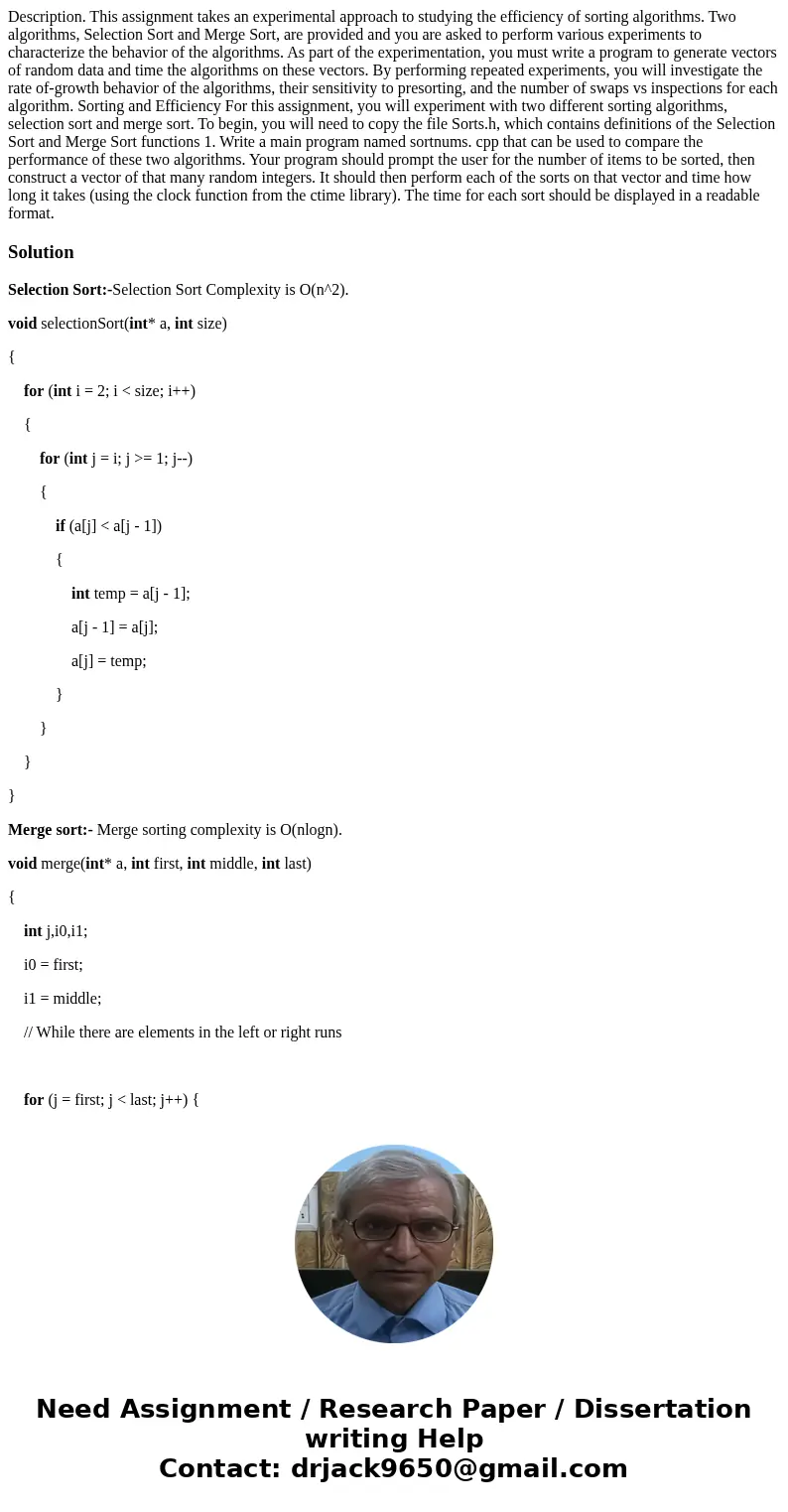
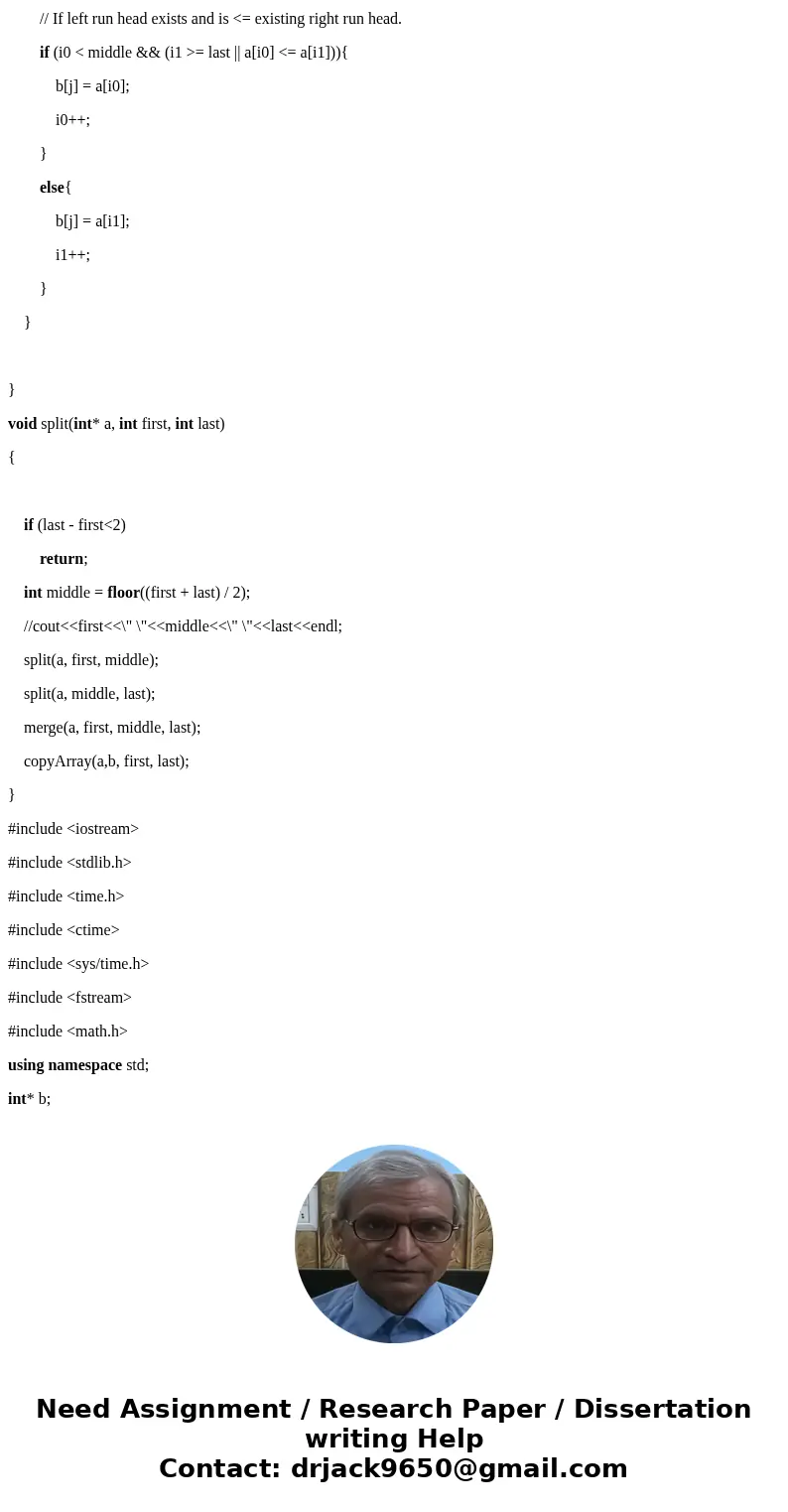
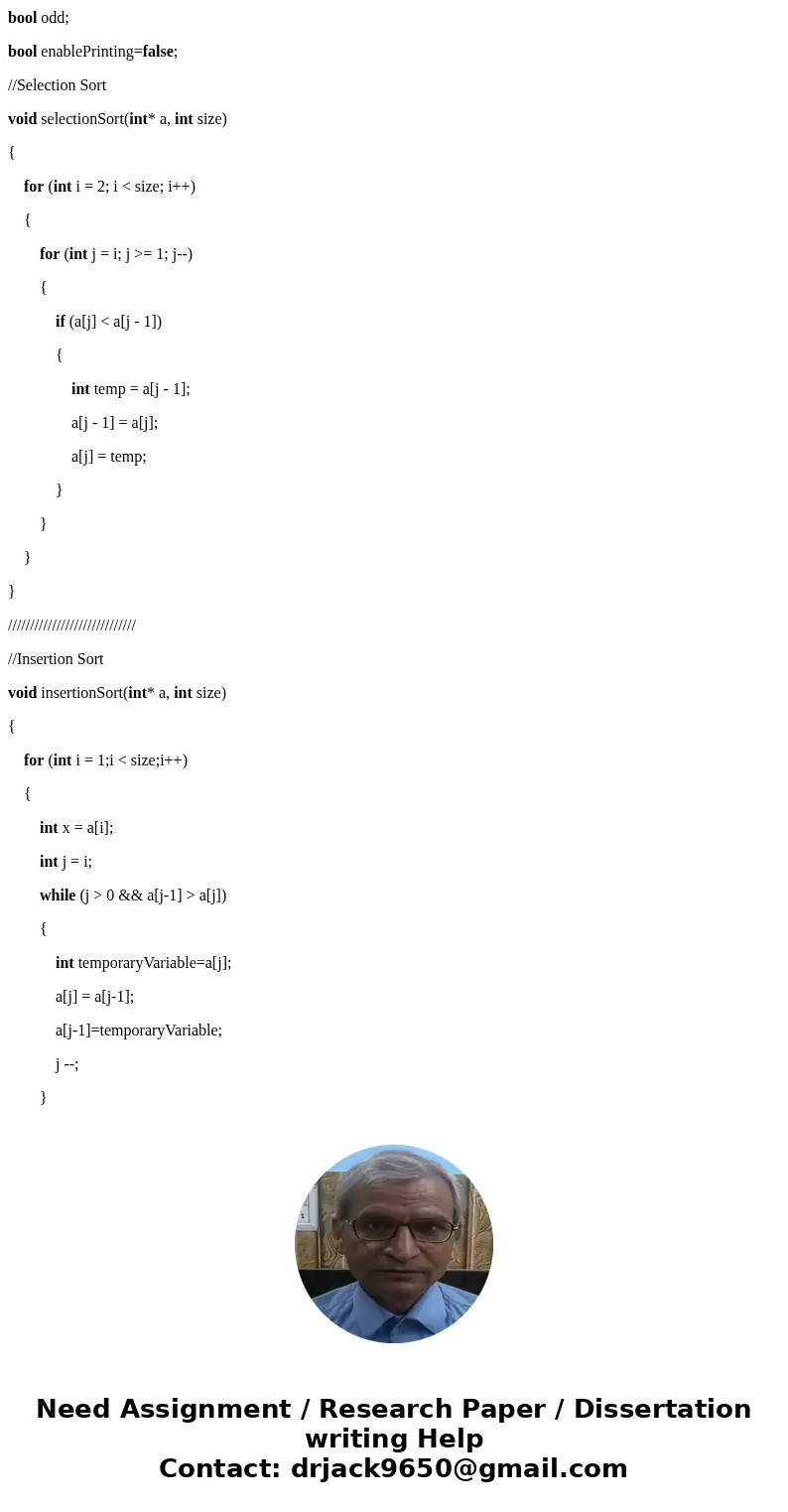
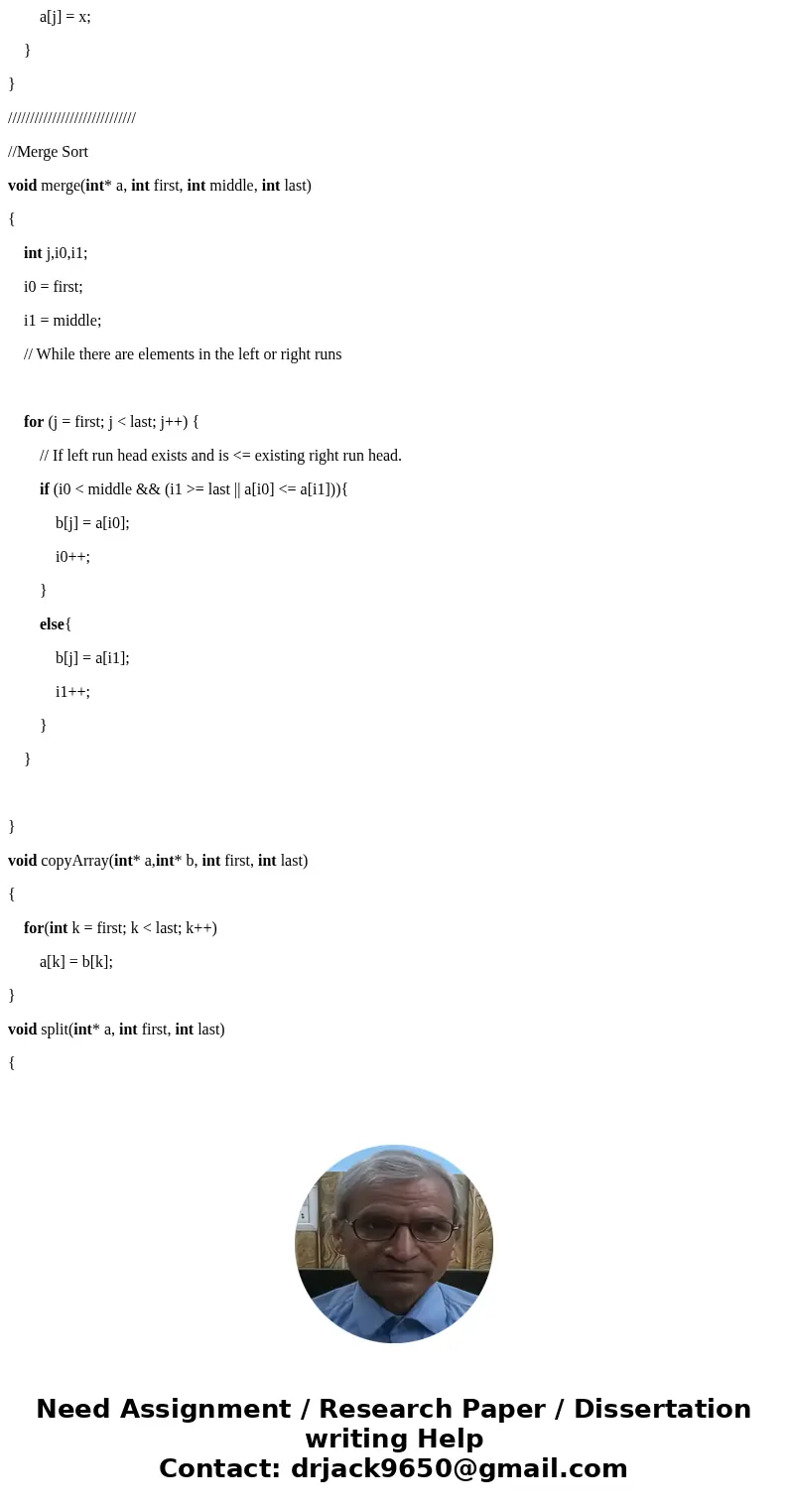
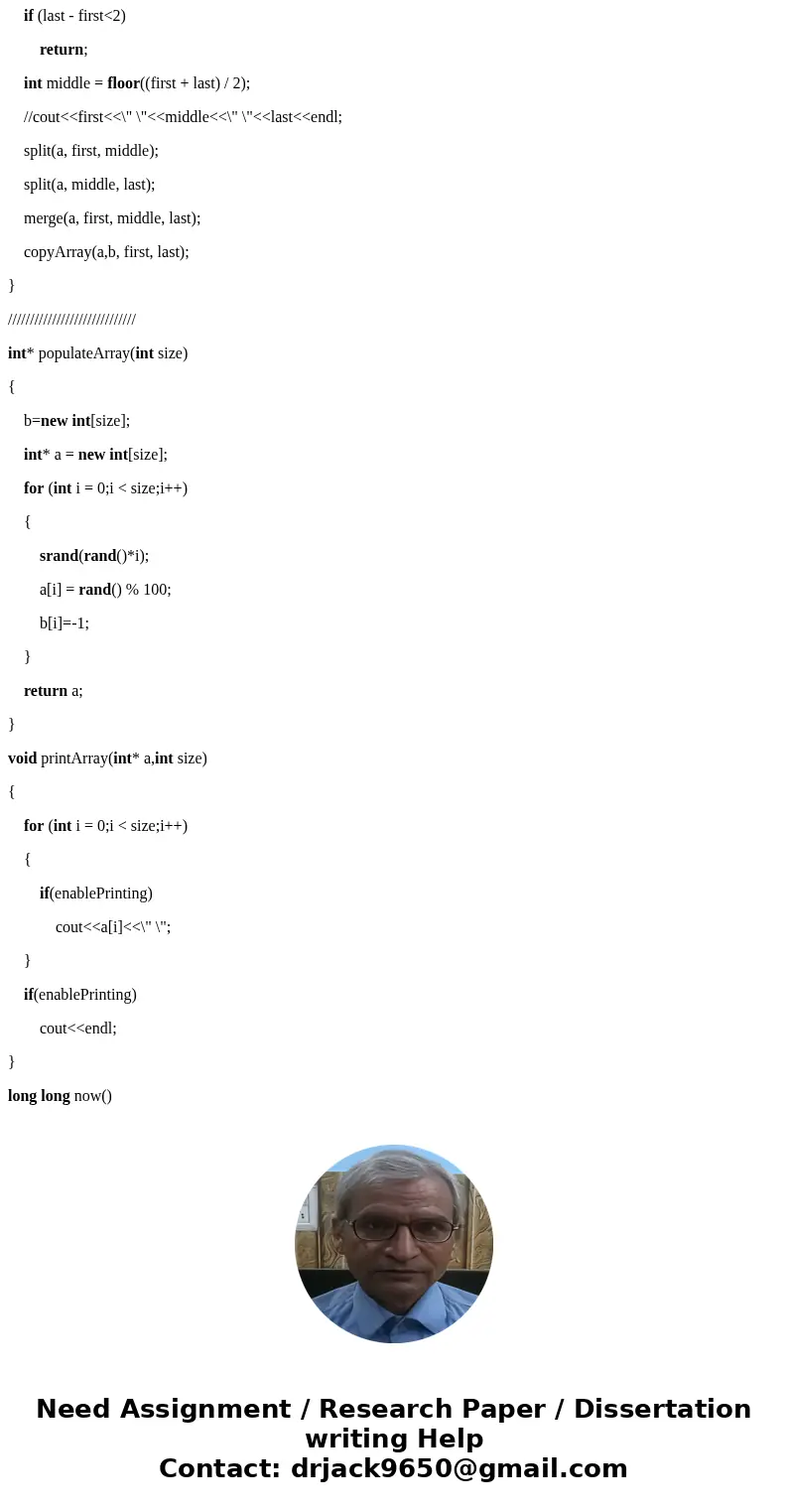
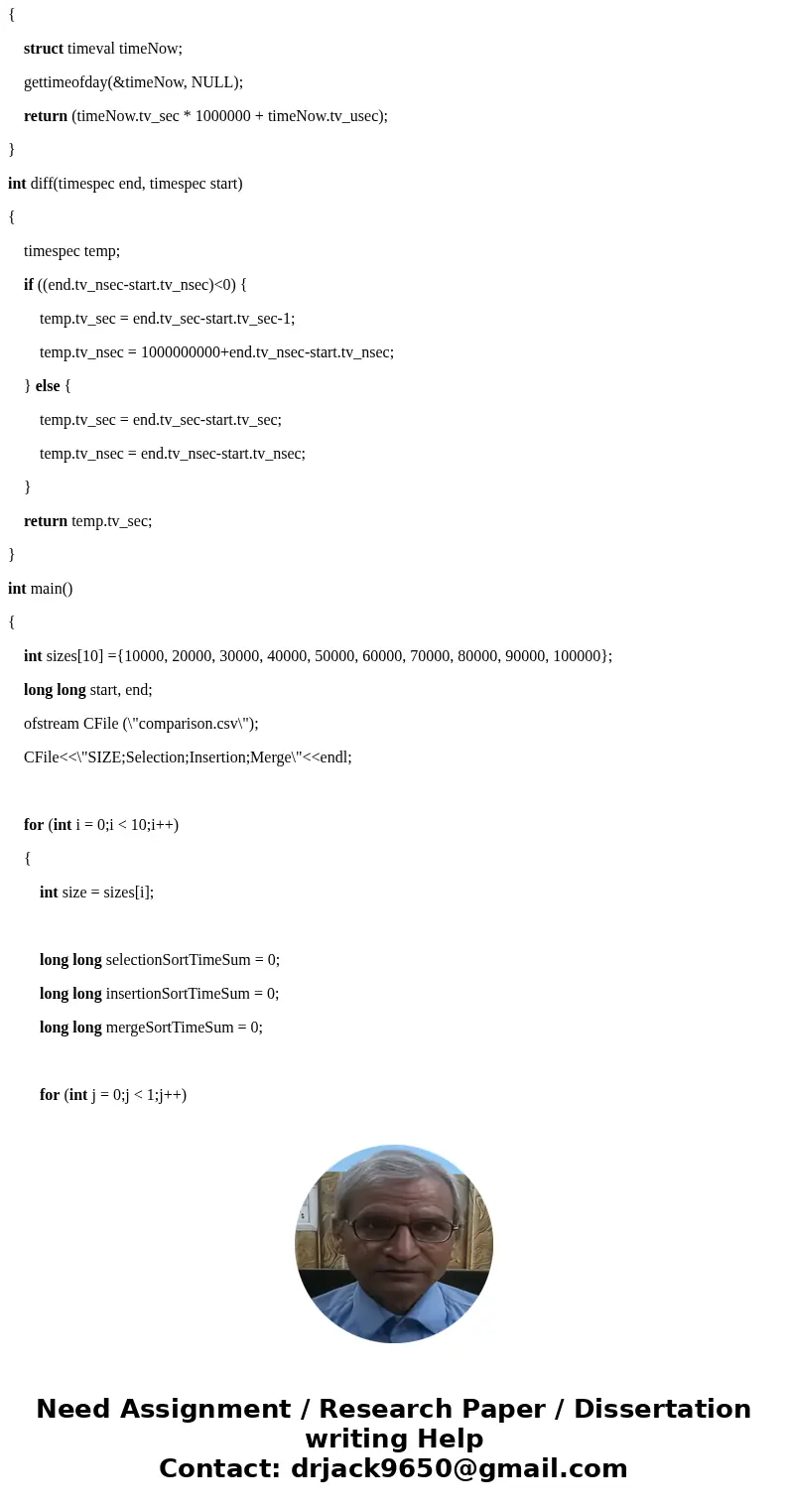
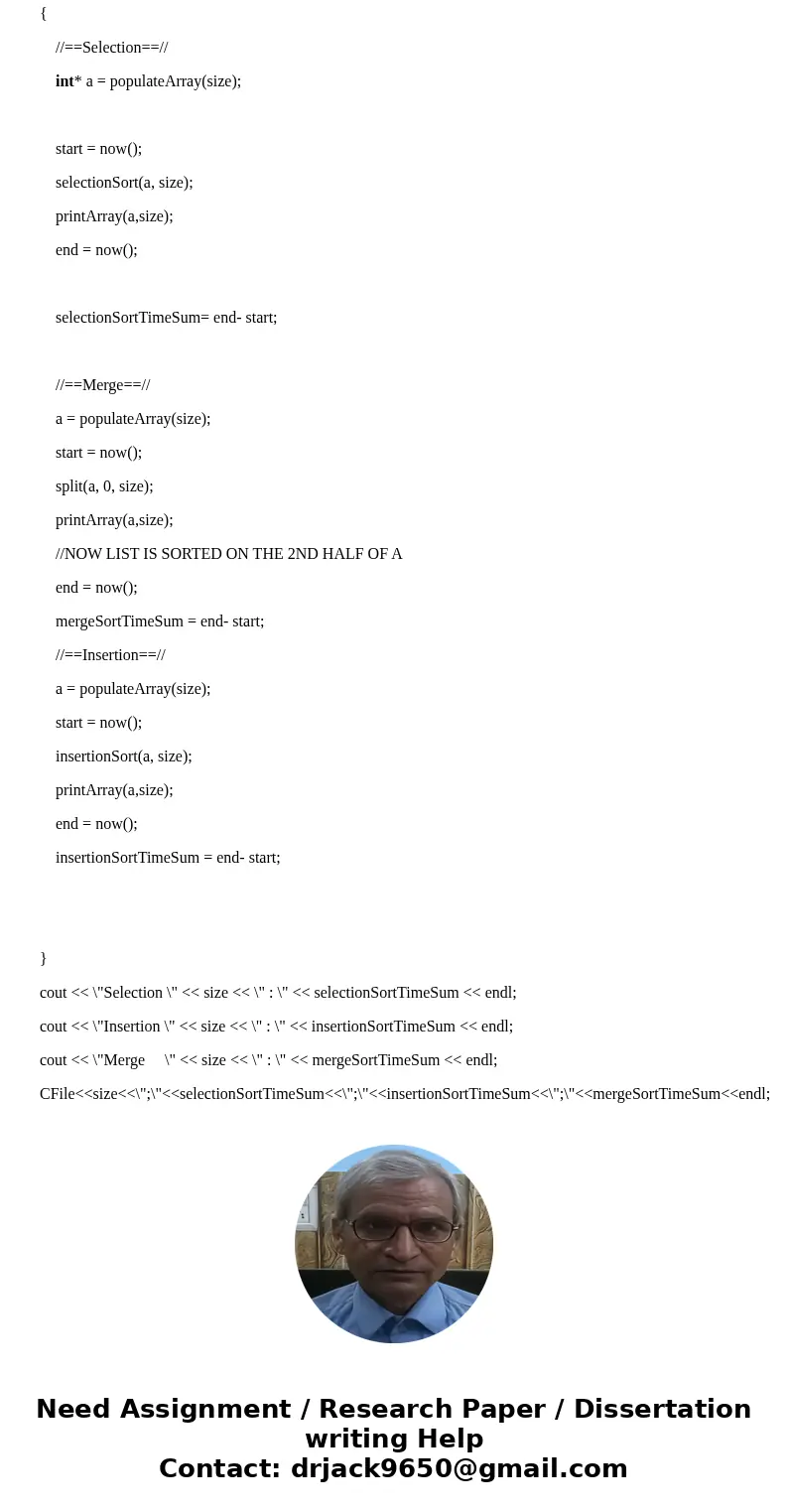
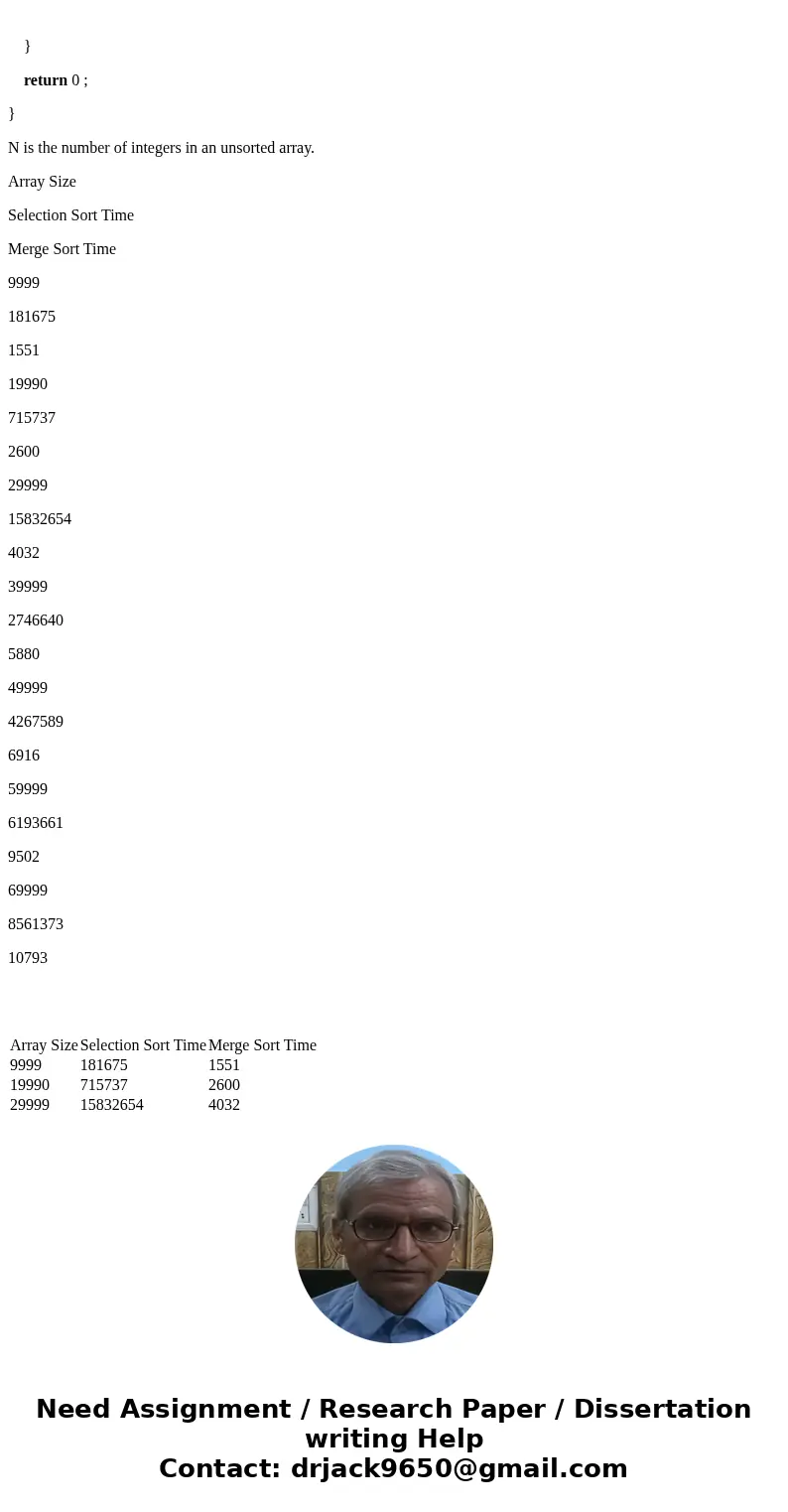
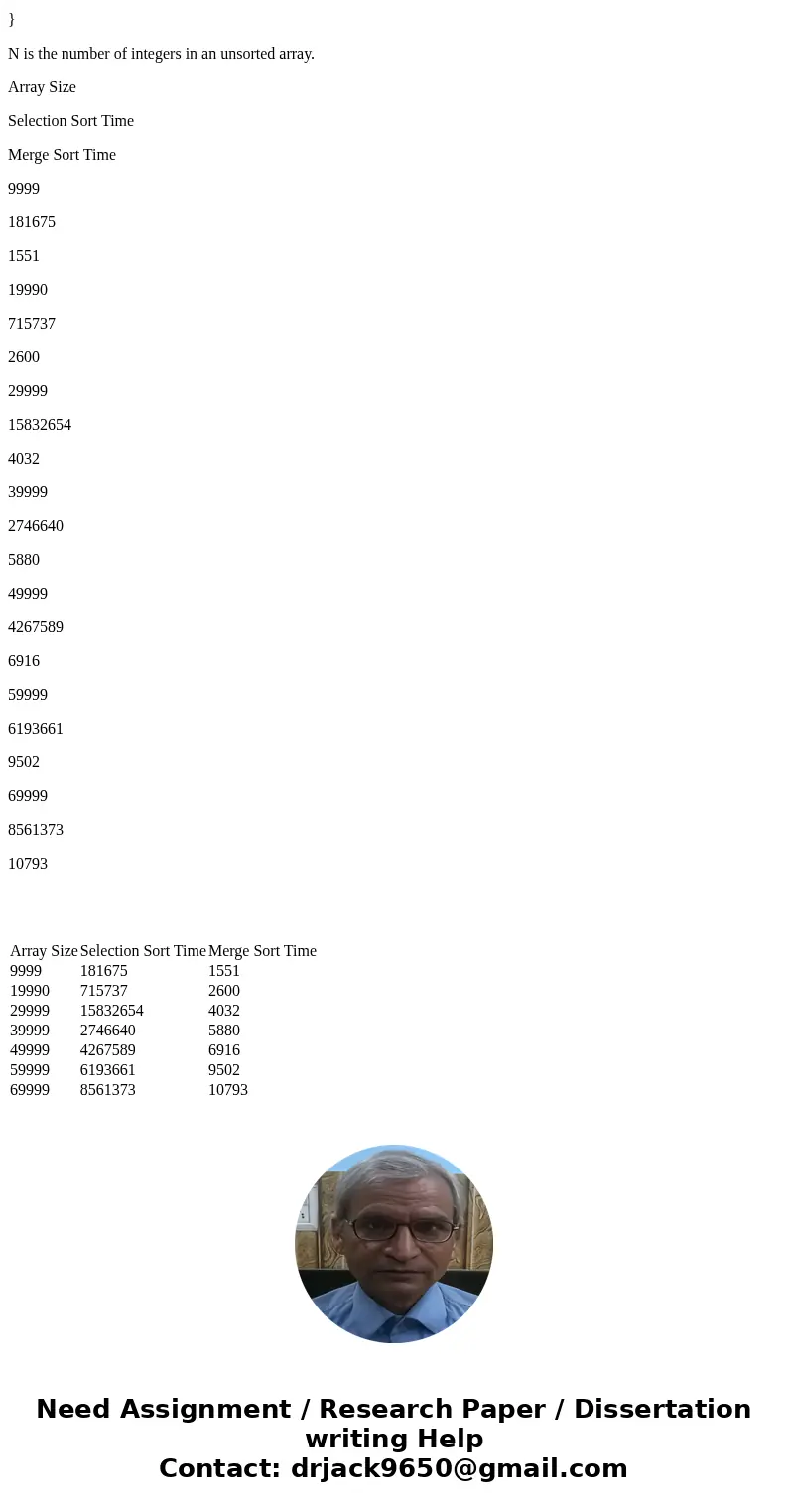
 Homework Sourse
Homework Sourse